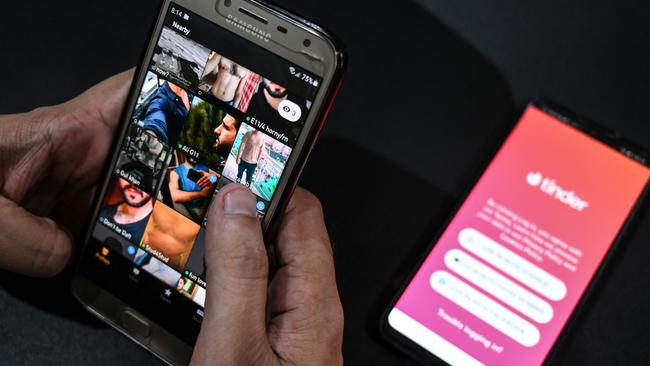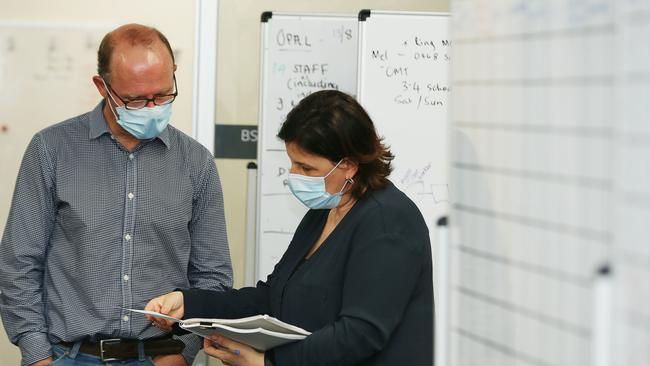Investigators are finding Elvis, Mickey and Trump among fake contact names
Efforts to track down close contacts are being hampered by COVID louts signing in as Mickey Mouse and Elvis at exposure sites.
Victoria
Don't miss out on the headlines from Victoria. Followed categories will be added to My News.
Social media footprints and even dating app histories are being used to track down people exposed to coronavirus who leave “dodgy” identification details or forget where
they’ve been.
Contact tracers have lost crucial hours in recent weeks uncovering the real identities of people who recorded their names as Mickey Mouse, Merry Christmas, B, Delivery Driver, Big Betty, Donald Trump and Elvis at COVID-19 exposure sites.
During the pandemic Victorian health investigators have also run into road blocks by suspected criminals with COVID-19 refusing to disclose who they have met with.
The Herald Sun can reveal that in some cases health investigators have even had to trawl through people’s dating app history to find out who they had anonymously hooked up with while infectious, because cases did not know the names of those they had dated.

While tools such as credit card tracking have become much more advanced in recent months, Deputy Chief Health Officer Dan O’Brien said accidental or deliberate misinformation was now adding to the time it took to get people into isolation.
“The people who did this are also the people you want to track the most, as those that do this often don’t do the right thing in other ways to prevent coronavirus and are thus more likely to have it," he said.
“The dodgy information is very common.
“Especially the manually sign in forms, half of it is not useful because people don’t put the full details in, they miss a number off their mobile phone number, they put wrong names in.
“But, that is where credit card transactions make a massive difference.”
Dr O’Brien – who heads up Victoria’s contact tracing program – told the Herald Sun 90 per cent of confirmed cases and their close contacts went out of their way to provide the most accurate information when interviewed.
However, a small number of cases either can’t recall or refuse to provide details, triggering more time consuming probes.
In these cases – such a party in Victoria’s second wave that involved drug taking and activities people would rather not admit to – contact tracers are having to examine overlapping social media footprints to identify here COVID-19 is likely to spread.

“There was a party with a group of people and there was stuff going on there they didn’t want to disclose,” Dr O’Brien said.
“Not everybody knew everybody but, by knowing one of the people and then looking through their social media posts you are able to discover who they associate with and track down other people at the party.
“Before you knew it, we started with one person at a party where no-one wanted to be associated and we had 10 in the end – and luckily enough we did because quite a number ended up positive.”
In other cases people with extensive criminal records or are well known to police have refused to detail who they have consorted with, seeing health investigators team up with local police officers who know which families or groups deal with each other, and where they typically are.
“Most people are open but there are others who clearly don’t want to disclose what they have been up to or don’t necessarily want their contacts to be known,” Dr O’Brien said.
“That makes things quite difficult.
“But certainly in some instances it has been very useful dealing with local police forces who know people and where they are.
“They were able to go down and track people down and actually get them to answer their phone or contact us.”
Contact tracers are increasingly working with banks to access the credit card histories of confirmed cases to determine exactly where, and when, they have been spending.
Once credit card information identifies a location tracers can then contact the business and their bank to gain electronic transaction records of everyone else who paid at the same time, identifying close contacts.
Such tactics are also helping to overcome the increasingly lax record keeping of some businesses or customers failing to provide accurate contact details.
“I think that we can, through various means, get to majority of people in most cases,” Dr O’Brien said.
“At the end of the day you only need one weak link in the chain and the virus can get out.
“We will go to all these extra lengths to make sure that we don’t miss that week link, but it does use a lot of time and resources and that always comes at a cost.
“If people truly don’t want to be found, they pay cash and write the wrong names … there are problem people we can’t find.”
Originally published as Investigators are finding Elvis, Mickey and Trump among fake contact names




